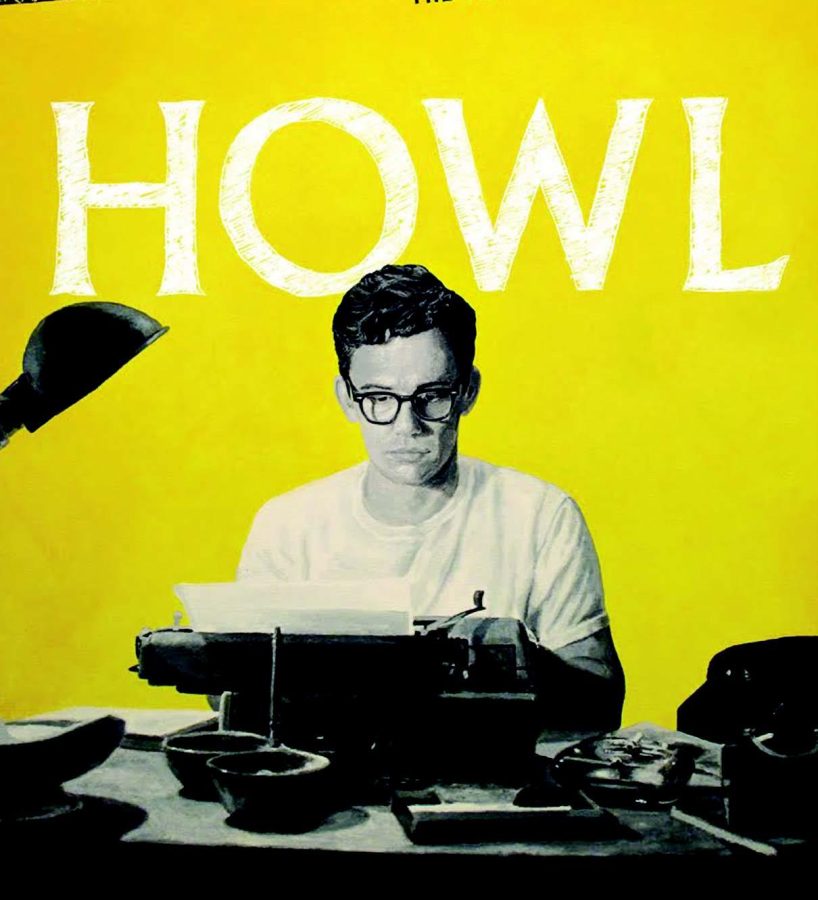“Who sweetened the snatches of a million girls trembling in the sunset,” is a relatively tame line in Allen Gins¬berg’s “Howl.” The poem set off censor¬ship alarms in uptight, straight-laced 1957 America. Directors, Rob Epstein and Jeff Friedman have re-created that pivotal moment in time. That moment would prove to be the birthplace of a new counter-culture, one that did not cling to the cookie-cutter mold of the previous conserva¬tive generation. It was the time of the Beat Generation. In the movie “Howl”, we see the story of Beat poet, Allen Ginsberg, during his formative period. The climactic achievement realized by his epoch shattering poem, Howl. Friedman and Epstein approached the project in a creative way, telling the story from three different vantage points, in which alternating perspec¬tives fit together into an aesthetically pleasing sequence. One storyline is the re-telling of the ground breaking 1957 obscenity trial that threatened to silence Ginsberg’s poem. A second storyline is expressed through an imagined interview with the young Ginsberg (played fantasti¬cally by James Franco), in which he reflects upon his writing process his creative inspirations, fears, difficulties, sense of vulnerability, and his coura¬geous commitment to absolute emo¬tional honesty. The third element of the story is the poem itself, parts of which are read aloud by Ginsberg in front of his contemporaries in smoke-filled coffee houses, with the rest of the poem vi¬brantly animated by graphic novelist Erik Drooker, in a style reminiscent of Pink Floyd’s “The Wall”. “Howl” is a big poem with a lot to say. It is “a vision of the world in four parts,” said Ginsberg. Although the poem is largely inspired by Ginsberg’s “coming out,” Ginsberg said that Howl is not about promoting homosexuality, “it’s a promotion of frankness.” After the Boston premiere of the film, Friedman and Epstein took ques¬tions from the audience. Epstein said that the dialogue in the trial scenes was taken from actual trial transcripts, and that everything Allen Ginsberg says in the entire movie was taken from tran¬scripts of interviews. Although this material has been edited, condensed and re-arranged, the movie offers ex¬traordinary insight into Ginsberg’s thoughts as he reflected on his forma¬tive years as a poet and on his own cre¬ative process. This film is about on a man and his poetry, but you don’t have to be a po¬etry buff to enjoy it. In fact, watching “Howl” made me want to read more of Ginsberg’s poetry -just what the direc¬tors said they hoped to accomplish. Howl is very well made and unique¬ly presented. The cast is loaded with great actors and the acting is superb. I enjoyed this film, found much of it inspiring, and I would recommend this movie to anyone, with the caveat that there are some frank descriptions of heterosexual and homosexual be¬havior and related feelings expressed within the movie. These may push your comfort zones; then again, maybe they won’t
Cover Art


